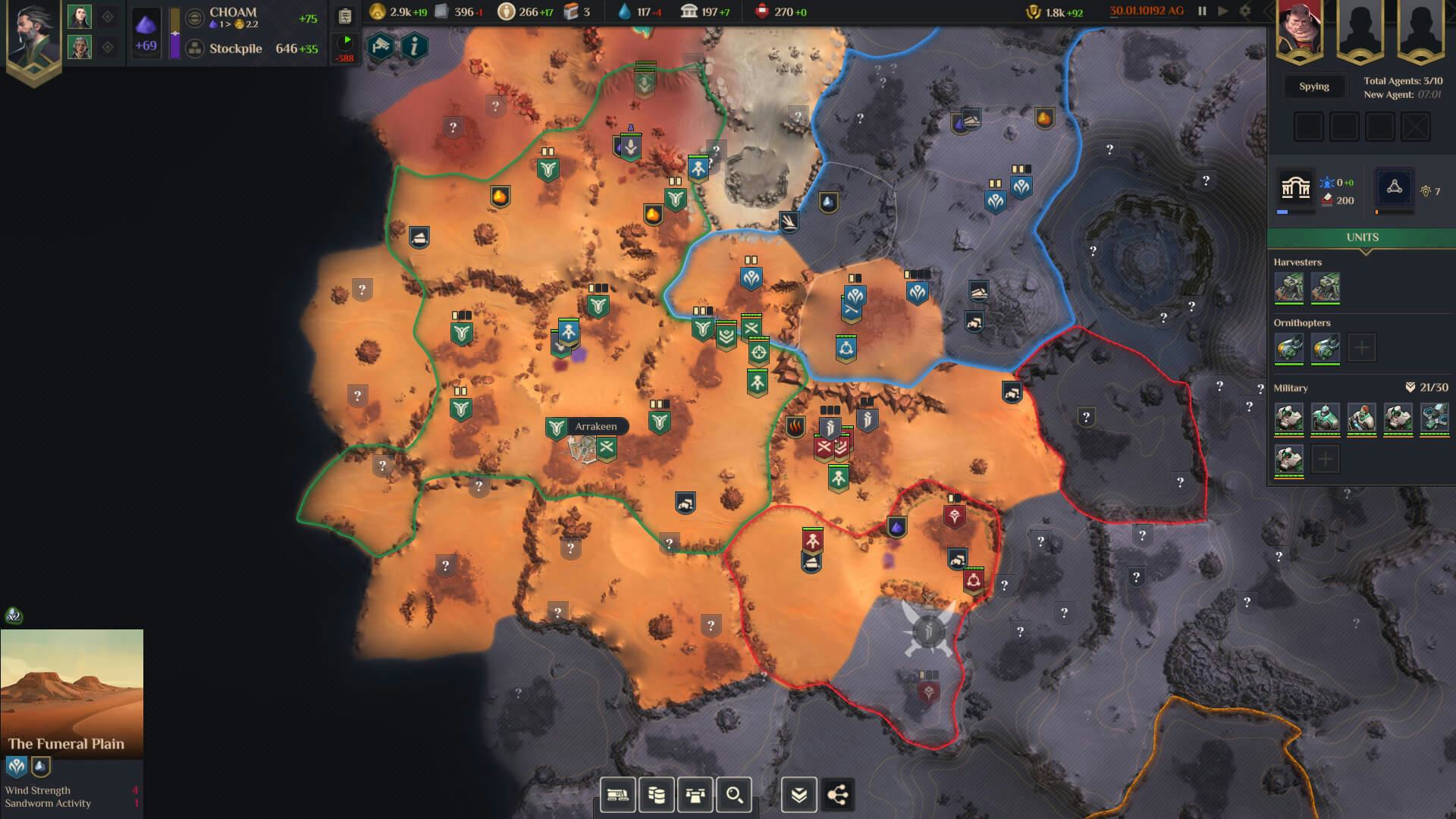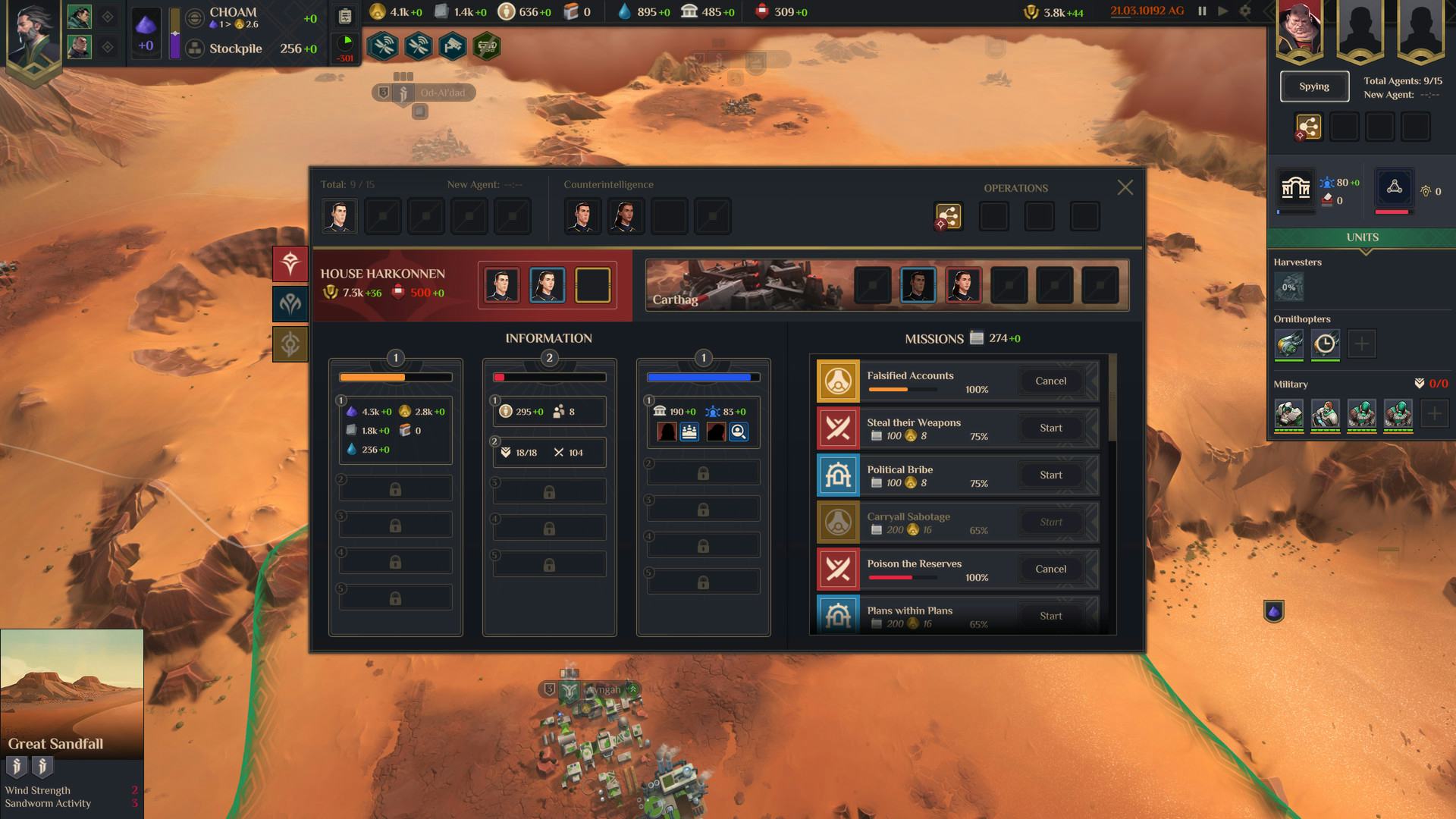
Dune is no stranger to strategy games, but it’s been over twenty years since we’ve seen a proper release, outside of the phenomenal Dune Wars mod for Civilization IV. With a universe drenched in politics and intrigue Dune has always been a perfect fit for the strategy genre, and Dune: Spice Wars hopes to make a sandworm size splash. Released in Early Access, Spice Wars definitely has some interesting ideas and a strong foundation, but it feels a bit underbaked and doesn’t take full advantage of the source material it’s based on.
Dune: Spice Wars falls somewhere in the middle of 4x and turn-based strategy, featuring a handful of elements from both genres. It’s not quite as complex as 4x titles like Civilization, but there are still a ton of inner working mechanics and systems to learn. At the start of a match, you pick from one of four main factions; House Atreides, House Harkonnen, the Smugglers, and the Fremen.
While the core gameplay remains the same for each faction, they all have specific quirks and bonuses that play into how you approach the match. For example, House Atreides has extra options for peacefully annexing villages and heavily focuses on an economic playstyle. Fremen, on the other hand, can maneuver around the map more easily by using sandworms, strike teams, and diplomacy.

Spice Wars has a ton of systems you need to pick up and learn in order to find victory. The very core of the game revolves around mining Spice and gaining control of the Arakkis economy and trade systems. You’ll need to manage an array of resources like Plastcrete (used to construct and upkeep buildings), water (a vital resource you need to survive), and manpower (used to build military units). The world map is made up of dozens of territories, and you’ll need to conquer the village in each territory in order to claim it. More territories mean more resources and building opportunities, and the most valuable territories contain resources caches like Spice fields and minerals.
On top of managing resources, there are other various systems that play into Spice Wars, including diplomacy and intrigue. This is where some of the game’s biggest problems start to come in. Spice Wars runs on a day system and every week the Landsraad holds a vote to pass new legislation, which can directly affect the flow of the game. The big problem I have here is that Spice Wars assumed players are already very familiar with Dune.
There’s no narrative structure to the game whatsoever, no explanation of the various faction’s stake in Arrakis, or who the Landsraad or Emperor even are. Obviously, Spice Wars is still in early access, but it feels like there’s no explanation of why you’re trying to take control of Arrakis, unless you go in already knowing the lore. It’s a game crafted for fans of Dune, but the strategy systems are far too complex for anyone not familiar with the genre, which really starts to show in the Landsraad and intrigue.

Each week the votes for the Landsraad open and you can assign the ones you’ve earned, as well as Influence earned, on which legislation you want to see pass. Some legislation benefits a specific faction, and you can vote for which faction gets it. Others will apply across the board, like bumping up Plastcrete maintenance by 30 percent. The real problem is that the game does a terrible job of explaining how you gain votes and Influence, or even showing you the amount you have. The same can be said for the intrigue system, which lets you assign agents to various factions and areas to gain Intelligence and a variety of other benefits.
There are a slew of numbers in the menu for assigning agents, but it’s hard to wrap your head around how each option benefits you. Intrigue is yet another resource that’s hard to track and is used to launch Operations that can benefit your faction or hinder others. Even past everything I’ve covered you still have military options that you can use to conquer other factions, and you’ll need to consider unit placement carefully to protect your own villages.
If all this sounds overly complicated, well, that’s because it is. Spice Wars has so many systems to keep track of that it can easily be overwhelming, and there are even three different ways to achieve victory in a match. The game’s tutorials do an absolutely terrible job of teaching you the game’s systems, and there’s simply a lot of trial and error required to learn everything. Anyone without any kind of experience in strategy games is going to find themselves incredibly lost. Some of these systems could stand to be simplified, and the UI needs to do a better job of displaying resources and explaining options.

After hours of learning the various systems of Spice Wars, I had a lot of fun balancing diplomacy and the military. It’s a complex game that really lets you flex your strategic muscles, but it has a lot of work to do in terms of making everything clearer and more accessible. My biggest disappointment with Spice Wars so far is how little it does with the Dune license.
Sure there are Ornithopter and Sand Worms but it all feels like window dressing. This could easily be any other sci-fi strategy game out there. In terms of both visuals and audio, it feels generic, which is so surprising considering how stellar of a job Denis Villeneuve’s Dune did at capturing a unique aesthetic. I’d like to see the game lean a little more into the interesting narrative threads of Dune, and forge a bit more of a unique path. Right now Dune: Spice Wars is a decent strategy game, but with a lot of work it could become a great one.
Dune: Spice Wars is currently out on Steam on PC in Early Access.







